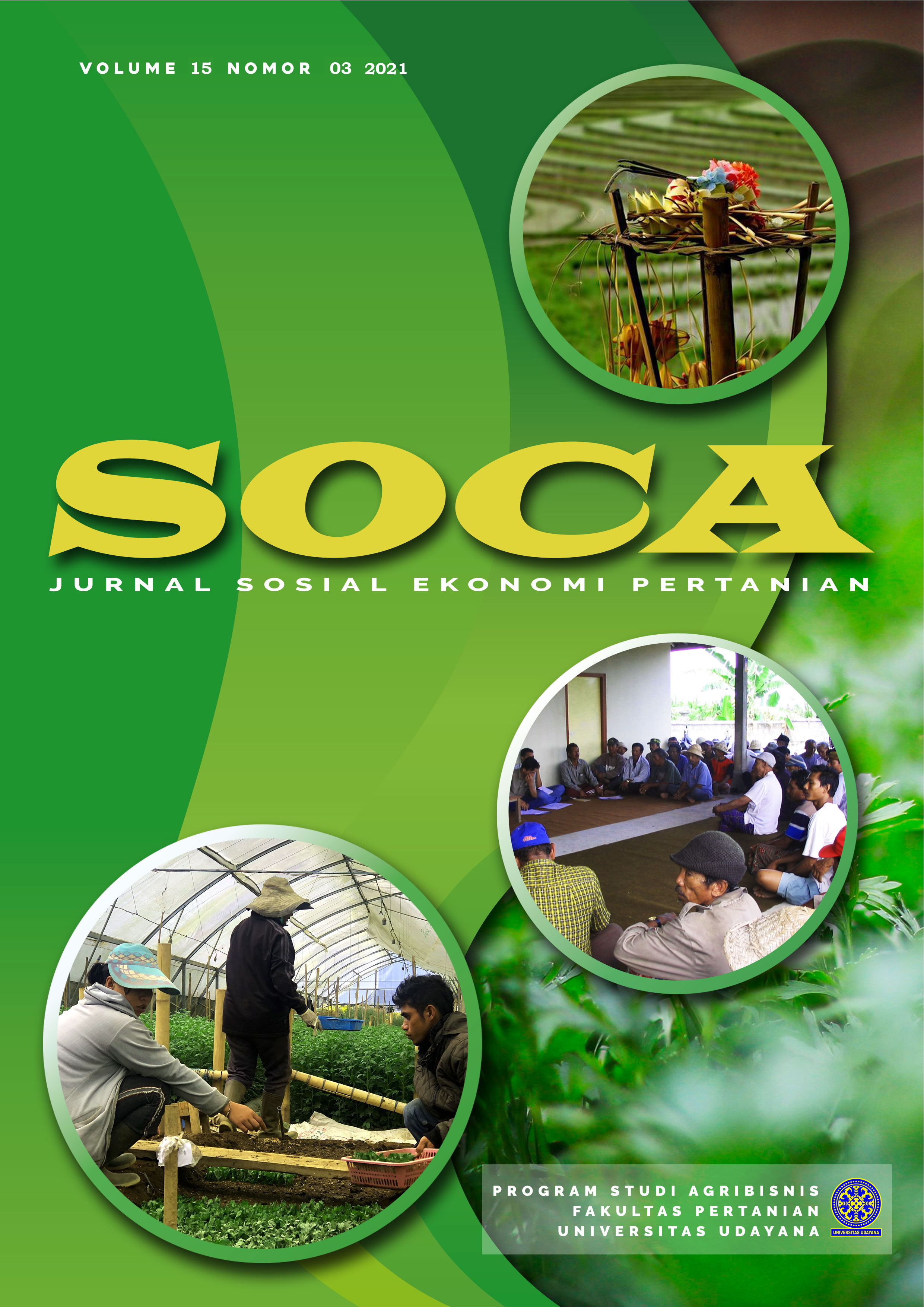The Competitiveness Analysis of Corn Farming on Peatland
Abstract
Agricultural sector, especially the corn commodity, has a very rapid development, especially in Kubu Raya Regency. The product that said to be able to compete the market if it has the ability to be competitive. Products that have high competitiveness were reflected in the price and good quality. But if product was not able to compete, it will bring new problems. Therefore, it was necessary to do some analysis, such as the analysis of the farming profitability and analysis of the competitiveness corn farming in peatland in Kubu Raya Regency. The purpose of this research was to analyze profitability, competitiveness, comparative and competitive advantage of corn farming on peatlands in Kubu Raya Regency. The technique that used was the survey method. The research location was conducted in Sungai Raya and Rasau Jaya Sub-districts. The reason was because it was the area that the largest main center of the corn production in the Kubu Raya Regency. The tool for analyzing used PAM. The result of the research analysis was for financial benefits and economic benefits, corn commodities that developed in peatland areas were feasible both financially and economically. This can be proven in financial terms that obtained by farmers of 15,264,746 Rupiah ha/year and from economic benefits of 9,867,664 Rupiah on 1 hectare/year land. The results of the competitiveness analysis showed that corn farming had comparative and competitive advantages. This can be found from DRCR and PCR values that were less than one. The government, in this case, provided assistance to farmers, in the form of subsidies for fertilizer, subsidized credit interest rates, and also provided positive incentives to farmers. The policy was very helpful for farmers to increase production.
Downloads
References
Kurniawan, A. Y. (2008). Analisis Efisiensi Ekonomi dan Daya Saing Usahatani Jagung Pada Lahan Kering di Kabupaten Tanah Laut Kalimantan Selatan. Bogor: Sekolah Pascasarjana Institut Pertanaian Bogor.
Kurniawan, A. Y. (2011). Analisis Daya Saing Usahatani Jagung pada Lahan Kering di Kabupaten Tanah Laut Kalimantan Selatan. Jurnal Agribisnis Perdesaan, vol (1) hal 83-99.
Malta. (2008). Kompetensi Jagung Dalam Berusahatani di Lahan Gambut : Kasus Petani Jagung di Lahan Gambut Di Desa Limnung Kabupaten Kubu Raya. Bogor: Sekolah Pasca Sarjana Institut Pertanian Bogor.
Mantau, Z. (2016). Daya Saing Komoditas Jagung Indonesia Menghadapi Era Masyarakat Ekonomi Asean. Jurnal Litbang Pertanian, vol ( 35). hal 89-97.
Radiansah, D., Radian, & Nurliza. (2016). Analisis Keunggulan Komparatif Dan Kompetitif Serta Implikasi Kebijakan Pemerintah Pada Komoditas Jagung di Kabupaten Bengkayang. Sosial Ekonomi of Agriculture, vol (V) ha 19-27.
Sastrya, H. W. (2014). Analisis Daya Saing Jagung Indonesia di Perdagangan Internasional. Prosiding Seminar Nasional & Temu Ilmiah Jaringan Peneliti (fv. 434-441). Surabaya: IAI Darussalam Blokagung Banyuwangi.
Soekartawi. (1995). Teori Ekonomi Produksi Dengan Pokok Bahasan Analisis Fungsi Cobb Douglass. Jakarta: PT. Raja Grafindo Persada.
Sudrajat, J., Darusman, Y., & Hardiyanto, T. (2018). Analisa Biaya, Pendapatan dan R/C Rasio Usahatani Jagung. Jurnal Ilmiah Mahasiswa AGROINFO GALUH, Vol 4 (2) page 729-734.
Suprapto. (2006). Keunggulan komparatif dan dampak kebijakan produksi jagung di Provinsi Jawa Timur. Buletin Penelitian Puslit Universitas Mercubuana, 89–106.
Suryana, A. T. (2014). Daya Saing dan Aliran Perdagangan Kakao Indonesia di Pasar Internasional [Tesis]. Bogor: Institut Pertanian Bogor.
Tahir, A. G. (2017). Analisis Pendapatan Usahatani Jagung Pada Lahan Sawah dan Tegalan di Kecamatan Ulaweng, Kabupaten Bone Sulawesi Selatan. Jurnal Galung Tropika, Vol 6 (1), page 1-11.
Thenu, S. (2014). Analisis Usahatani Jagung dan Keberlanjutannya di Pulau Kisar Kecamatan Pulau-Pulau Terselatan Kabupaten Maluku Barat Daya. Sosiohumaniora, , Vol 16: 201-205.
Yuniarto. (2018). Peran Pertanian Terhadap PDRB Nasional. Jurnal pertanian.













